|
Versión en español
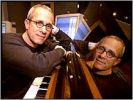 He's one of the great ones, make no mistakes about it. And here in BSOSpirit we're very honoured presenting you, our readers, this brief but intense interview. Honoured because we know how little he likes to speak about his work, and honoured because we've been fortunate enough to take these few impressions about his two latest works, The Village and Collateral. He's one of the great ones, make no mistakes about it. And here in BSOSpirit we're very honoured presenting you, our readers, this brief but intense interview. Honoured because we know how little he likes to speak about his work, and honoured because we've been fortunate enough to take these few impressions about his two latest works, The Village and Collateral.
This interview was going to be released just the same day Elmer Bernstein, that great Maestro that scored a before and after in movie music, passed away. So we decided to postpone a few days the interview, despite of the fact that we were dying to release it. We thought that a little homage to Elmer's memory worthed it, and that all of you can wait for these exclusive commentaries from a Major League composer like James Newton Howard.
From here we want to thank James and his charming assistant Annica, for all the help they have provide in getting this interview done.
Seville August the 18th. 19:30 P.M (local hour).
A distant bell rings...
James Newton Howard (JNH): Hi, this is James.
BSO Spirit (BS): Hi, James, this is Sergio, how are you?
JNH: Fine, thanks. And you?
BS: Fine too. As we have so little time I intend to focus the interview in a brief overview of your previous works with M.Night, and after that, comment a few things about The Village. And we can end the interview with a few questions about Collateral. Is that okay?
JNH: Yeah, that's fine.
BS:If you're ready we can begin.
JNH: Let's do it...
BS: How did your relation with M.Night began and how has it developed through the years?
JNH: 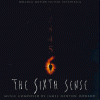 I was first contacted by Frank Marshall and Kathy Kennedy, who were the producers of The Sixth Sense... Night had another composer but he had serious doubts about the work he had done and wanted to change the composer. Frank and Kathy had previously worked with me and suggested Night, "why don't you think about James Newton Howard...", so that he did and I was invited to a screening of the picture at Disney and it blew my mind. It was temped with no film music but with Penderecki and Ligeti... and we had a lot of conversations by phone (Night and I) and decided to move forward... and in result I had five weeks to write the score in Philadelphia (where he always finish his films). As it was our first film together I would write demos of music and he would respond in a way or another to them. I was first contacted by Frank Marshall and Kathy Kennedy, who were the producers of The Sixth Sense... Night had another composer but he had serious doubts about the work he had done and wanted to change the composer. Frank and Kathy had previously worked with me and suggested Night, "why don't you think about James Newton Howard...", so that he did and I was invited to a screening of the picture at Disney and it blew my mind. It was temped with no film music but with Penderecki and Ligeti... and we had a lot of conversations by phone (Night and I) and decided to move forward... and in result I had five weeks to write the score in Philadelphia (where he always finish his films). As it was our first film together I would write demos of music and he would respond in a way or another to them.
Then on Unbreakable we had a conversation in which Night expressed me that he wanted for this film a more unique quality sound, because he felt that, although The Sixth Sense score served the movie very well, it hadn't a distinctive representative sound. So I begun writing themes for the next movie, and one of them was what ultimately would become the main title. So in result, with this way of working I came with a lot of material that Night would use as temp while he was cutting the movie. That was the moment when we started thinking of me writing music before he actually shoots the picture, and that's what we did in Signs.
BS: One thing that surprised me watching the behind the scenes on the DVD's was the fact that Night always thinks the movies as silent ones...
JNH: Yep. Night always does the cut of his films without any temp music; that way, editing turns itself in a very difficult process, because the music usually makes the picture look better (laughs).
BS: 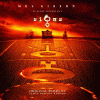 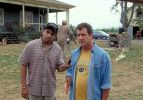 Of course (laughs). Of course (laughs).
JNH: With that fact in mind, Night and I are always trying to put as little music in our movies as possible. The best example of this intention is Signs. Our first intention was to only have music in the last 17 minutes... but in the end Night's movies are served very well by music, and we always end putting more music in the movies to make them work better.
BS: I already know that on Signs you worked very hard into make The Hand of Fate the masterpiece it is. But on the other two, which part would you say was the most difficult to compose?
JNH: As in which sections were difficult?
BS: Or a scene in particular...
JNH: You know, all is difficult (laughs).
BS: Each note! (laughs)
JNH: Almost each one. In Night's movies the music usual change directions several times during the process of composition, and I would say that... in Unbreakable there was no real equivalent to The Hand of Fate... the first thing I wrote for Unbreakable that went into the picture was the flashback scene where he reminds his car accident and that became the centre piece of the movie... but I'm moving apart from your question...
BS: Don't worry.
JNH: Well, all my scores with Night have been very challenging, and with the exception of The Sixth Sense, and I have been working on each of them almost 4 months.
BS: 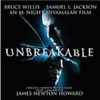 And regarding Unbreakable, was your idea or M.Night's to include such an eclectic sound that moves from the more tender parts of the film (those dedicated to the relation between David and Audrey) to the most acoustic parts (like the Station scene)? And regarding Unbreakable, was your idea or M.Night's to include such an eclectic sound that moves from the more tender parts of the film (those dedicated to the relation between David and Audrey) to the most acoustic parts (like the Station scene)?
JNH: Yes... and no. The first piece of music that I sent to Night was a small version of the Station scene... and I thought the piece was Ok but did not think it was going to work... but Night just loved that piece... so in a sense you could say it was my idea because I wrote it but you can also say it was his because he loved the theme so much that encouraged me to develop it to what ultimately became... truth is, my only regret about the Unbreakable score is the percussion section in that theme to have become dated and old-fashioned...
BS: Well, I can give you my opinion if you want...
JNH: Go ahead, but don't be too cruel (laughs).
BS: (laughs) I must say NO! I love that piece and the scene it underscores.
JNH: Well... thanks.
BS: Given the fact that many people regard Night's films as being some sort of Twilight Zone's long episodes; did you have that in mind when composing the music?
JNH: Never consciously, I mean, Herrmann and Goldsmith music are unavoidable music when you're composing for films like the ones I have done with Night...in fact the Main Title to Signs ended up being an unintended homage to Bernard Herrmann; the music it's very Hermannesque and Night changed the design of the titles when he heard what I had composed and put those exploding titles that were more stylized and had a 40's feeling to them... so it wasn't intentional and not because I'm a huge Twilight Zone fan...
BS: So am I (laughs).
JNH: (laughs) ...and the music has been very influential on me.
B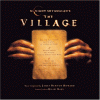 S: S:  Arriving into The Village the first impression I got when listening to the music was that, although you maintain certain Signs continuity with the drawings of the violin solos, this wasn't a usual James N. Howard sound. It's has a different flavour to anything you have composed so far and in a sense you could say it is very minimalist, very European, why the change in the music? Arriving into The Village the first impression I got when listening to the music was that, although you maintain certain Signs continuity with the drawings of the violin solos, this wasn't a usual James N. Howard sound. It's has a different flavour to anything you have composed so far and in a sense you could say it is very minimalist, very European, why the change in the music?
JNH: I never really make a conscious decision when I'm writing a score because I'm always trying to find some new ways in which to express what I have to say musically... the solo violin has always been one of my favourite instrument and included one on Snow Falling on Cedars... but here in The Village what I was trying to represent were two things: first the intimacy of what was going on in the relationships between the different characters and in the love story, and I wanted to keep it a small ensemble as possible... the other thing that I wanted to represent was the coming apart of The Village, the agitato that this utopian society is beginning to feel...and I thought the violin could represent in a single form both the love story between Noah and... I don't want to spoil the movie given that you haven see it (laughs)...
BS: (laughs) Try not to, please...
JNH: I thought I would be able to maintain a central idea using the ostinato violin that immediately relates to the woodwind ostinatos in Signs... that is really born out of Night's demands of me as a composer to maintain one idea trough the entire film... but I always try different things because I'm tired sick of listening to my music (laughs)...
BS: (laughs) Really? Well you shouldn't...
JNH: Yeah, and it's always better to go and try something new...
BS: As I asked you before regarding The Sixth Sense, Unbreakable and Signs, was there any cue or scene that was very difficult in terms of composing?
JNH: Well... I would say... it's probably very odd but the cue titled "The Gravel Road"... it sounds like a very simple cue... when the score was first written there was a completely different direction into it, it was more aggressive, there was more dark and menace in it... and it only several months after that music was composed that Night and I decided that we will emphasize the love story... so The Gravel Road is a very big moment of discovery, and was originally written very big, very grandioso, and it was very difficult to find the solution into changing the theme to a more subtle one... so the theme looks very simple in it's final incarnation, but it took a very long time to find the perfect sound for it.
BS: 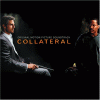 Jumping into Collateral it seems to us that you have travelled back in time at the point of your life where you were composing Hard Rock and A.O.R. How has this background helped you in terms of composing Collateral? Jumping into Collateral it seems to us that you have travelled back in time at the point of your life where you were composing Hard Rock and A.O.R. How has this background helped you in terms of composing Collateral?
JNH: Well, it involves many different elements into one single composition. It involves heavy percussion and electronic percussion, it involves a lot of orchestral work... I think anytime you do a thriller or an action score, the more electronic and contemporary background that you have; the better the fusion with traditional orchestra will be... in my case I spent a lot of years making records and touring with Elton John during the 70's, programming... and it all became part of me and a part that I very comfortable with... and Collateral was a situation where I was trying to mix many elements into one composition, and it's a process no new for me, it happens all the time...
BS:  Regarding the CD edition, it's an ordeal to try to listen to your music in the CD due to the fact that it has been edited among a lot of songs, and we want to know, is there more music apart form the one that has been released? Regarding the CD edition, it's an ordeal to try to listen to your music in the CD due to the fact that it has been edited among a lot of songs, and we want to know, is there more music apart form the one that has been released?
JNH: Oh, yeah... a lot more...
BS: I see...
JNH: It's a typical situation when you're working with Michael Mann, that's how he likes to edit his CD's...
BS: OK.
BS: To end this interview, what's in the near future for you?
JNH: Right now I'm ending a two month vacation period and I'm going to start working on The Interpreter; the Sidney Pollack new movie with Nicole Kidman and Sean Penn. I think that will take me into the next year where I'm looking to a couple of things, but haven't decided yet.
BS: Well, the only thing that rest is for you to tell me whatever you feel about the great loss that it has supposed the death of Jerry Goldsmith.
JNH: Jerry was my number one favourite composer of all time...
BS: So was mine...
JNH: Yeah, he's my personal hero and he influenced me more than any other composer... he wrote the most spectacular action cues ever and also he was a great melody writer. He was a great guy and would be deeply missed.
BS: Well James, it's been a great pleasure talking to you.
JNH: The pleasure's all been mine. Take care.
For more info on composer James Newton Howard, visit http://www.james-newton-howard.com/
Interview achieved for BSOSpirit
Questions: DDBSpawn, Sergio Benitez and Pablo Nieto.
Phone chat, transcription and translation: Sergio Benitez.
|





